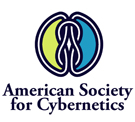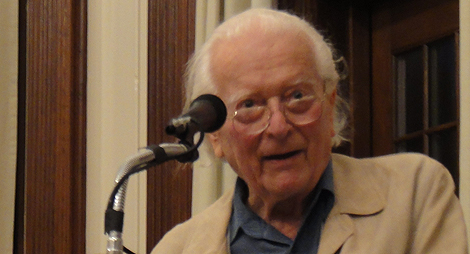Ernst von Glasersfeld’s C:ADM2010 dinner speech
Here is a recording of Ernst von Glasersfeld’s C:ADM2010 dinner speech, recorded on the 2nd of August 2010 at RPI’s Russell Sage Dining Hall, with an introduction by Ranulph Glanville:
Audio clip: Adobe Flash Player (version 9 or above) is required to play this audio clip. Download the latest version here. You also need to have JavaScript enabled in your browser.
The following is the manuscript of the speech:
I am very much aware of the fact that the invitation to speak at this dinner to a man who is well over ninety and is a quarter blind and three quarters deaf, is an extraordinary honor. The only reason why I felt I could accept it, is that my life has turned out to be an illustration of a cybernetic principle. I started out without any idea of what I wanted to do, but there were things I was very sure I didn’t want to do. I was not guided by a fixed purpose, but by a set of constraints. I was lucky that I had been brought up on skis and with more than one language. So when things got bleak, I could work as ski instructor in the winter and as translator during summers.
Fifty-one years ago* I was hired by the Institute of Cybernetics in Milan. They were submitting a proposal on machine translation to the U.S Air Force and it needed to be written in English. I was reputed to know several languages, and I did – in fact I have gone on until now speaking and writing essays in all of them.
1960 was a good time to get into cybernetics. Norbert Wiener was still alive, and he together with Warren McCulloch and Heinz von Foerster saw to it that the new discipline took an interest and made important contributions to philosophy and especially epistemology.
How we come to KNOW and what knowledge IS were favorite questions that, given the general character of cybernetics, tended to evoke the notion of self-regulation. This inevitably led those who were interested in the psychology of knowing, rather than the mechanics of self-regulating mechanisms, to the work of Jean Piaget, who twenty years earlier had written
The mind organizes the world by organizing itself.
Warren McCulloch characterized our epistemological situation in an even more radical way:
To have proved a hypothesis false is indeed the peak of knowledge.
Physicists such as Bohr, Schrödinger, Heisenberg or Dirac, had long realized that what we call knowledge is and can only be built of concepts that we derive from experience and therefore can not be supposed to represent a world beyond the experiential interface. Psychologists and biologists still cling to the belief that the models they construct are somehow uncovering a “real” world. Once you get rid of the traditional preconceptions, all of which are easy to recognize as metaphysical fictions, you cannot avoid the conclusion that the relation between our experience and an independent universe is something we cannot even begin to investigate. The only way out of the world of experience are pious fictions, that cannot provide a glimpse of a knower-independent reality.
Only painters, poets, musicians and other artists like mystics and metaphysicians, may generate metaphors of reality, but to comprehend these metaphors you have to step out of the rational domain.
What remains are naïve beliefs, like Descartes’ that God could not have been so mean as to give us deceptive senses; or Einstein’s that God would not have created a universe that could not be comprehended by man.
Cybernetics is the only discipline that can easily cope with this epistemological situation. It is not dependent on the principle of causality and therefore need not search for a cause of our experience. As it operates with the notion of constraints, it has no difficulty in living with the realization that all we can know of the world is that it constrains the models we generate for acting and thinking.
*) In the manuscript, Ernst von Glasersfeld corrected an inadvertent error in his talk: he started working with Silvio Ceccato in Milan in 1959, 51 years ago from when he presented his after dinner talk.
 © Ernst von Glasersfeld and the American Society for Cybernetics. This recording and the manuscript text may be reproduced under the Creative Commons license, quoting the title with full credits to copyright holders, publication URL, (http://www.asc-cybernetics.org/2010/?p=2700), and date of accessing.
© Ernst von Glasersfeld and the American Society for Cybernetics. This recording and the manuscript text may be reproduced under the Creative Commons license, quoting the title with full credits to copyright holders, publication URL, (http://www.asc-cybernetics.org/2010/?p=2700), and date of accessing.









very cool.
what a brilliant and generous man. thank you Ernst for talking to us and thanks to the organizers for making this possible!